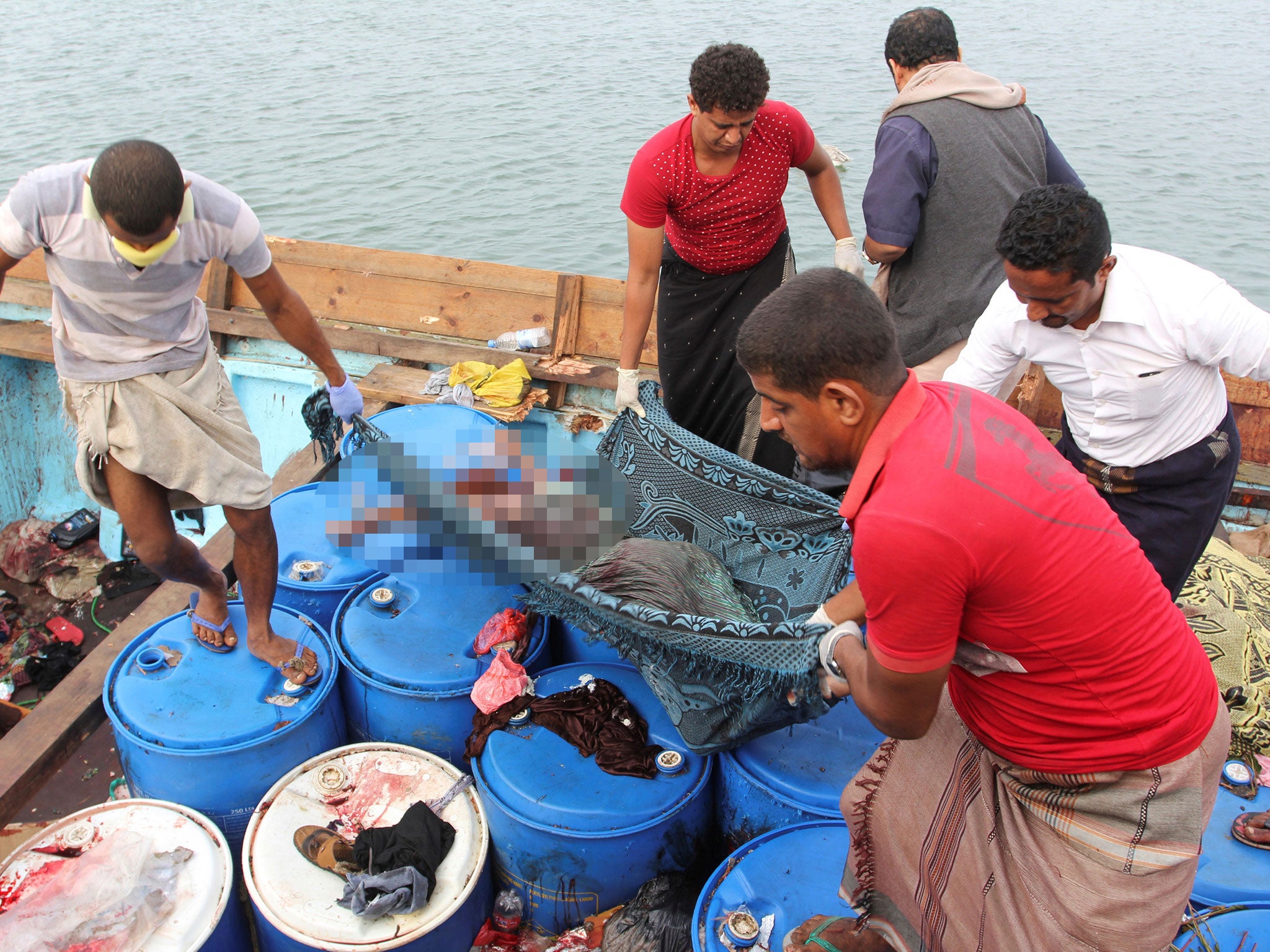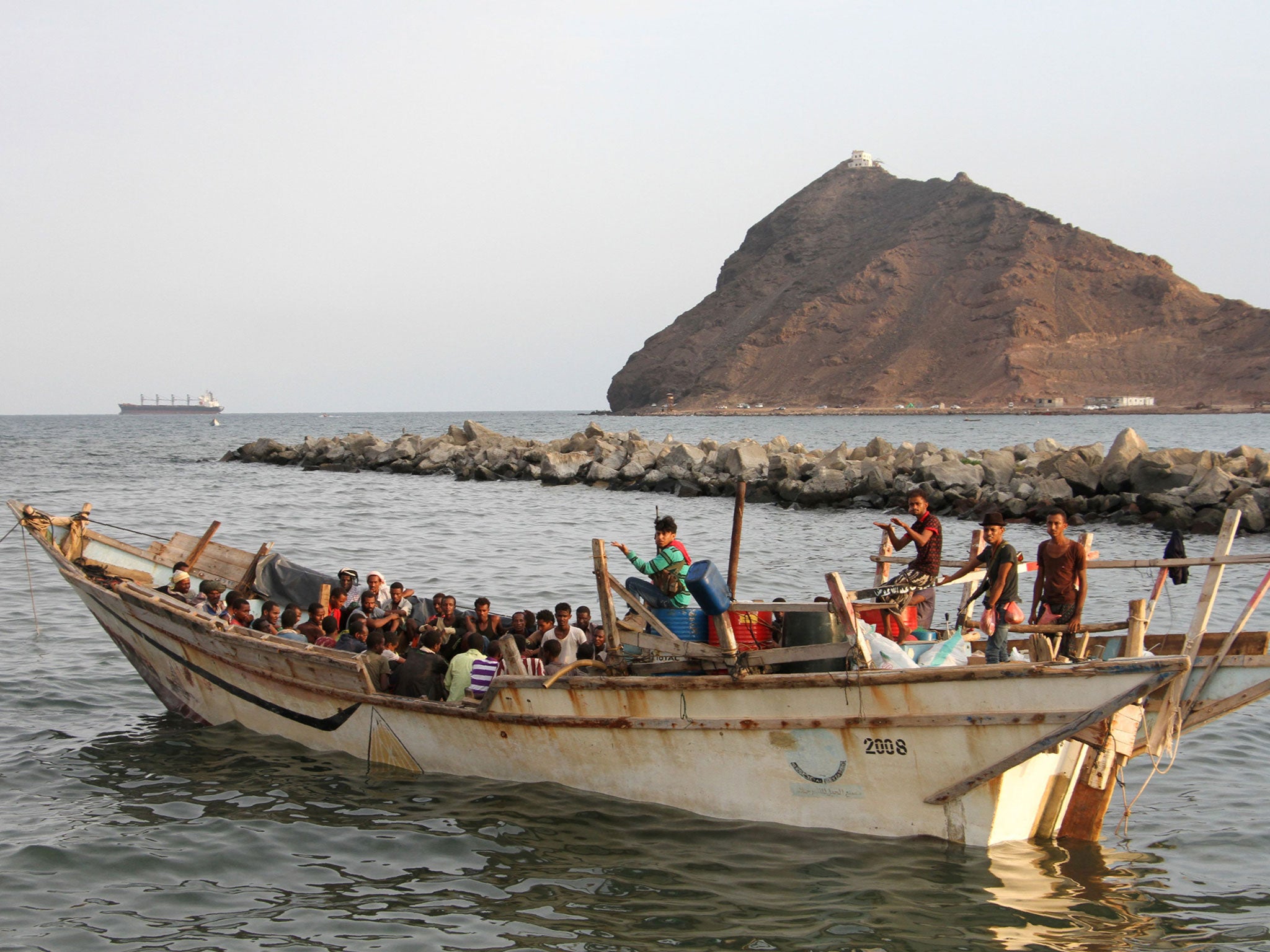More than 40 refugees killed in helicopter attack on boat in Yemen while trying to flee civil war
UN says it is ‘appalled’ by massacre as worsening conflict forces people to flee

Your support helps us to tell the story
From reproductive rights to climate change to Big Tech, The Independent is on the ground when the story is developing. Whether it's investigating the financials of Elon Musk's pro-Trump PAC or producing our latest documentary, 'The A Word', which shines a light on the American women fighting for reproductive rights, we know how important it is to parse out the facts from the messaging.
At such a critical moment in US history, we need reporters on the ground. Your donation allows us to keep sending journalists to speak to both sides of the story.
The Independent is trusted by Americans across the entire political spectrum. And unlike many other quality news outlets, we choose not to lock Americans out of our reporting and analysis with paywalls. We believe quality journalism should be available to everyone, paid for by those who can afford it.
Your support makes all the difference.More than 40 Somali refugees have been killed in an attack on a boat off the coast of Yemen while attempting to flee the country’s brutal civil war.
Coastguard authorities in the Houthi rebel stronghold of Hodeida said a helicopter gunship attacked the vessel they were travelling on in the Red Sea.
A Yemeni people smuggler who survived the attack said the boat had set sail overnight, aiming to cross to Sudan.
Al-Hassan Ghaleb Mohammed said women and children were among his passengers from the port of Ras Arra, along the southern coastline in Yemen’s Hodeida province.

He told the Associated Press that their boat had reached around 30 miles from shore when the helicopter gunship approached and opened fire, sparking panic on board.
Migrants finally managed to hold up torches to show they were civilians, when he said the helicopter stopped firing.
Photos that were too graphic to publish showed the bodies of women and men in civilian clothes lying on top of one another in the partially destroyed boat, their belongings splattered with blood. Children were believed to be among the dead.
Mohamed al-Alay, a coastguard official, told Reuters the refugees, carrying official UN documents, were attacked by an Apache helicopter near the Bab-el-Mandeb strait.
Houthi rebels accused the Saudi-led air coalition of carrying out the attack, following heavy bombardment in the area, where it accuses Shia fighters of smuggling weapons into Hodeida in small boats.
The International Organisation for Migration said at least 42 people had been killed and dozens injured on the boat, which had about 140 people on board. The survivors – 75 men and 15 women – were taken to detention centres.
The UN Refugee Agency (UNHCR) said it was “deeply distressed” by the casualties and called for all parties in the Yemeni civil war to protect civilians in accordance with international law.
“UNHCR is appalled by this tragic incident, the latest in which civilians continue to disproportionately bear the brunt of conflict in Yemen,” spokesperson William Spindler said.
“UNHCR has been following up to provide urgent assistance and support to the survivors and to the families of those deceased.”
The agency warned that conditions in Yemen were continuing to deteriorate, forcing asylum seekers to leave the country either northwards or across the Red Sea, including some with the intention of reaching Europe.
“This tragic incident is the latest in which innocent civilians, including Yemenis, refugees, asylum seekers and migrants, continue to suffer and disproportionately bear the brunt of the conflict in Yemen,” Mr Spindler said.
It was not immediately clear who carried out the attack, although Saudi-led forces including the United Arab Emirates are known to deploy Apache helicopters as part of their air campaign in support of President Abdrabbuh Mansour Hadi.
The coastal province of Hodeida has come under heavy bombardment in recent years as a stronghold of Houthi rebels, who are fighting the internationally-recognised government alongside forces loyal to former President Ali Abdullah Saleh.
Yemen’s civil war, which is about to enter its third year of bloodshed, has allowed terrorist groups including Isis and al-Qaeda in the Arabian Peninsula to seize territory and carry out attacks.
Despite violence that has left more than 10,000 people dead and 17 million facing starvation, African migrants seeking work in Saudi Arabia have continued using Yemen as a transit point.
Yemen is hosting over 255,000 Somali refugees, with more than 117,000 new asylum seekers arriving in the country last year as the UNHCR ran a campaign warning of the dangers of crossing the Gulf of Aden and Red Sea, as well as inside the country.
Oxfam warned that with the conflict worsening, Somalis are being displaced for a second time, joining thousands of people attempting to flee on boats to the Horn of Africa.
Almost 1 million Somalis are displaced in surrounding countries and 1.1 million inside the country itself according to the UN, which said the three-decade-long refugee crisis is “among the most protracted in the world”.
Peter Salisbury, a senior research fellow in the Middle East and North Africa Programme at Chatham House, said it was the first military attack on a refugee boat he was aware of. Describing the conflict as a “forgotten war”, he said many migrants had been unable to leave the Yemen.
“Although it has displaced hundreds of thousands of people they haven’t been able to flee or get further than neighbouring countries,” he told The Independent.
“We haven’t seen the flow of refugees into Europe, which makes a huge difference in public understanding and the western approach.”
Somali refugees were previously killed in Yemen during a brief conflict between northern and southern forces in 1994, when hundreds died after their camp was caught in the crossfire.
Additional reporting by agencies